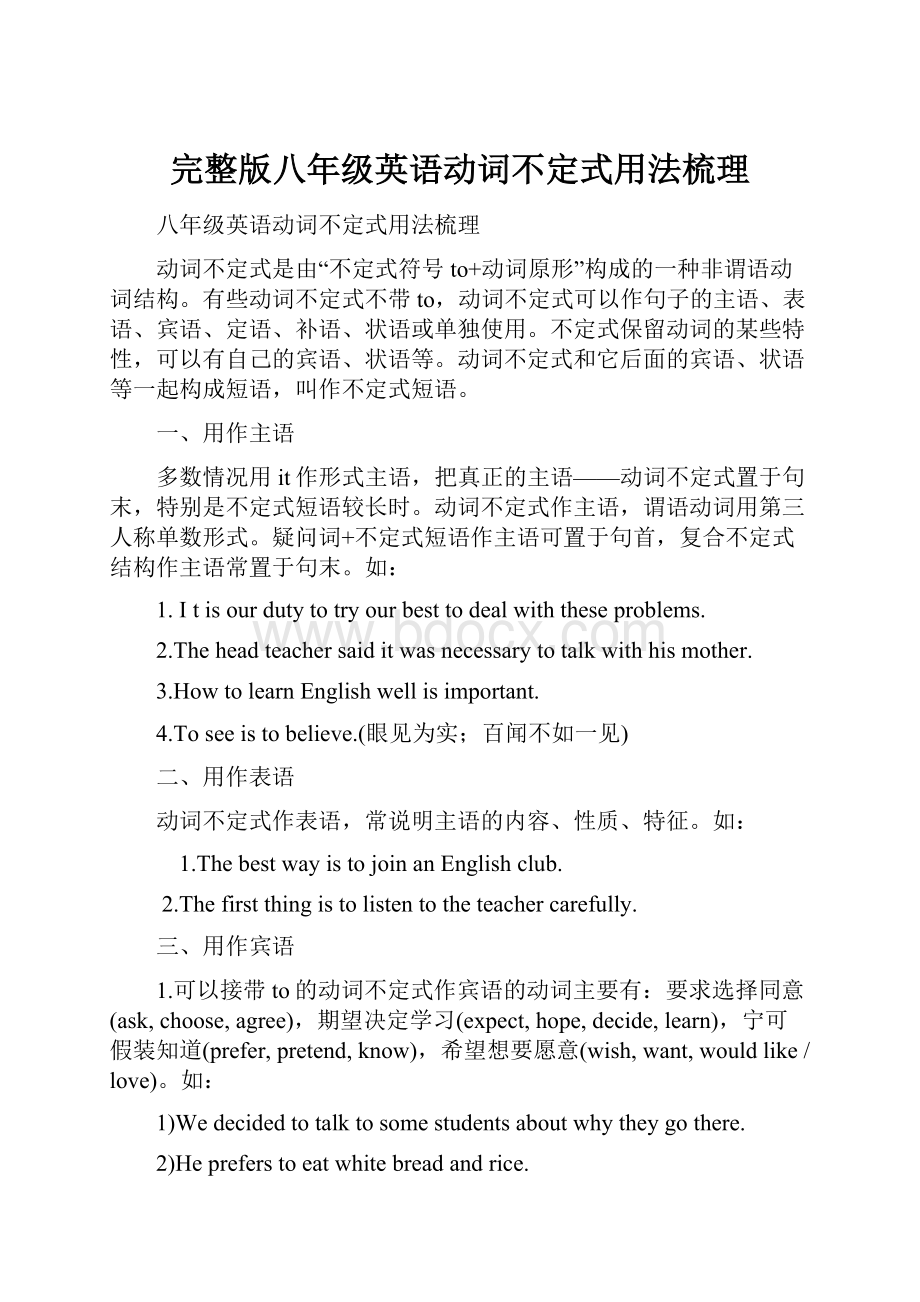 完整版八年级英语动词不定式用法梳理.docx
完整版八年级英语动词不定式用法梳理.docx
- 文档编号:24236188
- 上传时间:2023-05-25
- 格式:DOCX
- 页数:8
- 大小:19.88KB
完整版八年级英语动词不定式用法梳理.docx
《完整版八年级英语动词不定式用法梳理.docx》由会员分享,可在线阅读,更多相关《完整版八年级英语动词不定式用法梳理.docx(8页珍藏版)》请在冰豆网上搜索。

完整版八年级英语动词不定式用法梳理
八年级英语动词不定式用法梳理
动词不定式是由“不定式符号to+动词原形”构成的一种非谓语动词结构。
有些动词不定式不带to,动词不定式可以作句子的主语、表语、宾语、定语、补语、状语或单独使用。
不定式保留动词的某些特性,可以有自己的宾语、状语等。
动词不定式和它后面的宾语、状语等一起构成短语,叫作不定式短语。
一、用作主语
多数情况用it作形式主语,把真正的主语——动词不定式置于句末,特别是不定式短语较长时。
动词不定式作主语,谓语动词用第三人称单数形式。
疑问词+不定式短语作主语可置于句首,复合不定式结构作主语常置于句末。
如:
1.Itisourdutytotryourbesttodealwiththeseproblems.
2.Theheadteachersaiditwasnecessarytotalkwithhismother.
3.HowtolearnEnglishwellisimportant.
4.Toseeistobelieve.(眼见为实;百闻不如一见)
二、用作表语
动词不定式作表语,常说明主语的内容、性质、特征。
如:
1.ThebestwayistojoinanEnglishclub.
2.Thefirstthingistolistentotheteachercarefully.
三、用作宾语
1.可以接带to的动词不定式作宾语的动词主要有:
要求选择同意(ask,choose,agree),期望决定学习(expect,hope,decide,learn),宁可假装知道(prefer,pretend,know),希望想要愿意(wish,want,wouldlike/love)。
如:
1)Wedecidedtotalktosomestudentsaboutwhytheygothere.
2)Hepreferstoeatwhitebreadandrice.
3)IdlovetovisitMexico.
2.动词decide,know,learn,show,teach,tell...,介词结构on...可用疑问词带to的不定式短语作宾语,但why后面的不定式不带to。
如:
1)Couldyoupleasetellmewheretoparkmycar?
2)Itgivesadviceonwhattodoinlotsofdifferentsituations.
3.动词feel,find,make,think等后面,可以用it作形式宾语代替真正的宾语——动词不定式,句子结构是...feel/find/make/...it+adj./n.+todo...。
如:
4.感知动词like,love,know等一般不用进行时态。
5.后接动词不定式或ving形式作宾语,意思差别较大的动词有forget,remember等。
后接不定式作宾语,表动作尚未发生;后接ving形式作宾语,表动作已经发生。
stoptodo停下来做另外一件事,todo是目的状语;stopdoing停止做、不做当前这件事,doing是宾语。
trytodo尽力做,trydoing试试看;goontodo接着做另外的事,goondoing继续做原来的事。
如:
1)WhenIlefthome,Iforgottobringitwithme.
2)Istoppedusingthemlastyear.
四、用作定语
1.句子的主语或宾语是动词不定式的逻辑主语,不定式与其所修饰的名词、代词等存在逻辑的动宾关系.
1)Ihavesomanyclothestowashtoday.
2)Ican’tthinkofanygoodadvicetogiveher.
3)Wehavenohousestolivein.
2.动词不定式所修饰的名词是place,time,way等时,不定式与这些名词呈现出动状关系或同位关系。
如:
1)Heneedstimetodohomework.
2)Hewantstoknowthebestwaytotravelaroundthecity.
3.在“therebe...”句型里,句子的主语是动词不定式动作的对象:
1)There’sjustsomuchtoseeanddohere.
2)...buttherearestillmanythingstodothe
五、用作宾语补足语
1.带to的动词不定式作宾语补足语的动词主要有:
要求允许提议(ask,allow,,advise),期望邀请鼓励(expect,,invite,encourage),教导告诉想要(teach,tell,want),等待希望愿意(waitfor,wish,wouldlike/love)。
如:
1)Idinvitehertohavedinneratmyhouse.
2Weshouldallowthechildrentochoosetheirownclothes.
2.动词不定式作补语,在主动语态句里不带to,被动语态句里带to时多数动词是感官动词和使役动词,包括四“看”:
lookat,observe,see,watch,三“让”:
have,let,make,二“听”:
hear,listento,一“感觉”:
feel,一“注意”:
notice。
如:
1)Thispicturemakesmefeelexcited!
2)WesawLiuYuplaybaseballlastweek.
3.help后接动词不定式作补语,to可带可不带。
1)theycanhelpyoutolearnEnglish.
2)UsingemailEnglishhelpsyouwritequickly.
六、用作状语
1.目的状语,置于句首或句末,置于句首时常表示强调。
如:
1)Inordertocatchtheearlybus,shegotupveryearly.
2)Agroupofyoungpeoplegottogethertodiscussthisquestion.
3)Shecametothiscitytovisitherdaughter.
2.原因状语,多见于“sb.+be+adj.+todo...”结构句中。
如:
1)Ifeelveryluckytohavehim.
2)heranoutofmoneytobuyoldbikes.
3.结果状语,多见于“too...to”,“enoughto...”结构句中。
如:
1)I’mtootiredtodoitwell.
2)Theroomisbigenoughforthreepeopletolivein.
七、动词不定式的复合结构
动词不定式的复合结构是“for/ofsb.todosth.”,for/of引出不定式动作的逻辑主语。
这种结构在句子中可以作主语、宾语、表语、定语、状语等。
不定式复合结构的介词用for还是of,主要决定于前面形容词的性质。
一般说来,of前面的形容词是careful,clever,foolish,good,kind,nice,wise等,既说明人的特性,又说明不定式动作的特性。
for前面的形容词是dangerous,difficult,easy,hard,heavy,important,interesting,necessary等,一般说明不定式动作的特性,前面如果是名词用for。
如:
1.It’sagoodideaforparentstoallowchildrentostudyingroupsduringtheevening.
2.It’swiseofhimtodoitwell.
3)Isitinterestingforthebabytoplaywithapetdog?
八、带疑问词的不定式短语
动词不定式前面可以带疑问代词what,which,who或疑问副词how,when,where,why等。
这种结构起名词的作用,在句子里用作宾语、主语、表语等,或者单独使用。
要注意的是,why后面的不定式不带to。
如:
1.用作句子的成分。
1)Idon’tknowwhattotrynext.(作宾语)
2)Wheretogoisnotdecidedyet.(作主语)
2.单独使用时相当于一个特殊疑问句。
1)Whattodonext?
(=Whatwillwe/youdonext?
2)Whygothere?
(=Whydowe/yougothere?
九、动词不定式的否定式
不定式的否定式是not/nevertodo...,不带to的不定式的否定式是not/neverdo...如:
1.Theydecidenottotalktoeachother.
2.Hisparentstellhimnevertoplaysoccerinthestreet.
随堂练习一动词填空。
1.I’mgoingtolistentotheradio.Please____(nottalk)anymore.2.Thestudents____(do)theirhomeworkfromfourtofivethisafternoon.
3.Thestudents____(be)busynow.They____(have)anEnglishexamnextMonday.
4.Marymust____(look)afterherlittlesisterbecausesheistooyoung.
5.____(he)youwaitingforabusnow?
6.Thiscoatisverycheap.I____(take)itnow.
7.I’lltellhimaboutitwhenhe____(come)back.
8.Couldyoutellmehow.I____(canget)toNo3Middleschool.
9.He____saidthatthenewteacher____(give)thestudentsanEnglishlessonnow.
10.I____(milk)acowthreetimes.
11.Edison’smother____(teach)himherself.
12.He____(watch)TVonceaweek.
13.Don’tspeakloudly.Thebaby____(sleep).
14.Iwon’tgooutuntil.I____(finish)myhomework.
15.Couldyoutellmewhenthetrain____(arrive).
16.Ioftenhearthesoundofchildren____(read)Englishintheroom.
17.Heaskedme____(help)himwithhisEnglishthisevening.
18.Theirworkis____(clean)thestreets.
19.Didheenjoy____(work)inChina.
20.Wewillstayathomeifit_____(rain)tomorrow.
21.Bequiet!
Theboy____(sing)anEnglishsong.
22._____you_____yourhomeworkyet(start)?
23.Who____(teach)themEnglishlastterm.
24.There_____(be)atelephonecallforyoujustnow.
25.Pleasekeepeverything____(clean).
26.Peterwon’thavearestuntilhe____(finish)hiswork.
27.IwatchedTV,soI____(forget)_____(do)myhomework.
28.WhenI____(walk)alongtheriver,Imetmyfriend,Tom.
29.WhenMothercame,thelittlegirl____(play)withacat.
30.WhenIwasfive,I____(get)toknowtheearth____(move)aroundthesun.
31.They_____(see)aboy_____(fall)intotheriverwhilethey____(pass)ityesterday.
32._____(study)hardatyourlessonsand(nottalk)inclass.
33.You_____(have)better_____(noteat)thebadfood.
34.WhileI___(do)myhomework,myparents__(watch)TV.
35.He____(notfinish)____(read)thebook.
36.I____(get)upveryearlythismorning.I____(read)Englishnow.
37.He____(hurry)toschooleverymorning.
38.Ourteacher____(notstop)____(work)untileleveno’clocklastnight.
39.Ifhe____(know)it,he____(be)veryhappy.
40.It____(take)ushalfanhour____(read)Englisheveryday.
41.Thechildren____(run)inthestreetnow.
42.There____(be)twomeetingstomorrowmorning.
43.Myfather____(sleep)whenI____(get)upthismorning.
44.WhenI____(go)toseeTom,he____(notwrite)anything.
45.Sorry,whenyou____(call)me,I____(think)and____(nothear)you.
46.Mr.Green____(leave)hisnotebookathomeyesterday.
47.I____(want)tobuyanewcoatnextSunday.
48.Hisfather____(read)newspaperwhenIgotthere.
49.It____(be)fiveyearssincehe____(buy)themotorbike.
50.Wefounditwasverydifficult____(get)acar.
51.Wearesoglad________(hear)thenews.
52.Isawhim________(cross)theroadsafelyand________(run)away.
53.Youcan’tmakehim________(do)whatyouwant.
54.Idon’tknowwhere________(meet)him.
55.Whatmakesyou________(think)I’mafarmer?
56.Didyouseehim________(go)upstairs?
57.Itisbetter________(put)yourmoneyinabank.
58.Itisdifficultfortheboy________(swim)acrosstheriver.
59.Ilethim________(go)earlyashewanted________(meet)hisuncleatthestation.
60.Willyouhelpme________(move)thebed?
61.Ifhedoesn’tknow,how________(use)therecorder,you’dbetter________(show)him.
62.Heisthelastone________(leave)theofficeeveryday.
63.It’sbadmanners________(shout)inpublic.
64.Theboyisoldenough________(dress)himself.
65.Sheistooill________(go)toschool.
二选择题
1.Tellhim___thewindow.
A.toclosenot B.nottocloseC.tonotclose D.notclose
2.Pauldoesn'thavetobemade___.Healwaysworkshard.
A.learn B.tolearn C.learned D.learning
3.You'dbetter_______thestoryinJapanese.
A.say B.speak C.tell D.talk
4.Thepatientwaswarned___oilyfoodaftertheoperation.
A.toeatnot B.eatingnotC.nottoeat D.noteating
5.----Iusuallygotherebytrain.
----Whynot___byboatforachange?
A.totrygoing B.tryingtogo C.totryandgo D.trygoing
6.Therearesomebooksonthefloor,wouldyoulike________?
A.topickthemup B.topickupthemC.pickitup D.pickupit
7.Sheisveryill,let's_______adoctoratonce.
A.towakeup B.sendforC.topayfor D.payfor
8.Iwant________ateacherwhenIgrowup.
A.tobe B.to C.be D.being
9.It'scoldhere.You'dbetter______yourcoat.
A.nottakeout B.nottotakedownC.nottakeoff D.nottotakeaway
10.Mymothertoldme________morewater.
A.drinking B.drank C.todrink D.drink
- 配套讲稿:
如PPT文件的首页显示word图标,表示该PPT已包含配套word讲稿。双击word图标可打开word文档。
- 特殊限制:
部分文档作品中含有的国旗、国徽等图片,仅作为作品整体效果示例展示,禁止商用。设计者仅对作品中独创性部分享有著作权。
- 关 键 词:
- 完整版 年级 英语 动词 不定式 用法 梳理
 冰豆网所有资源均是用户自行上传分享,仅供网友学习交流,未经上传用户书面授权,请勿作他用。
冰豆网所有资源均是用户自行上传分享,仅供网友学习交流,未经上传用户书面授权,请勿作他用。


 《当代世界政治与经济》.docx
《当代世界政治与经济》.docx
